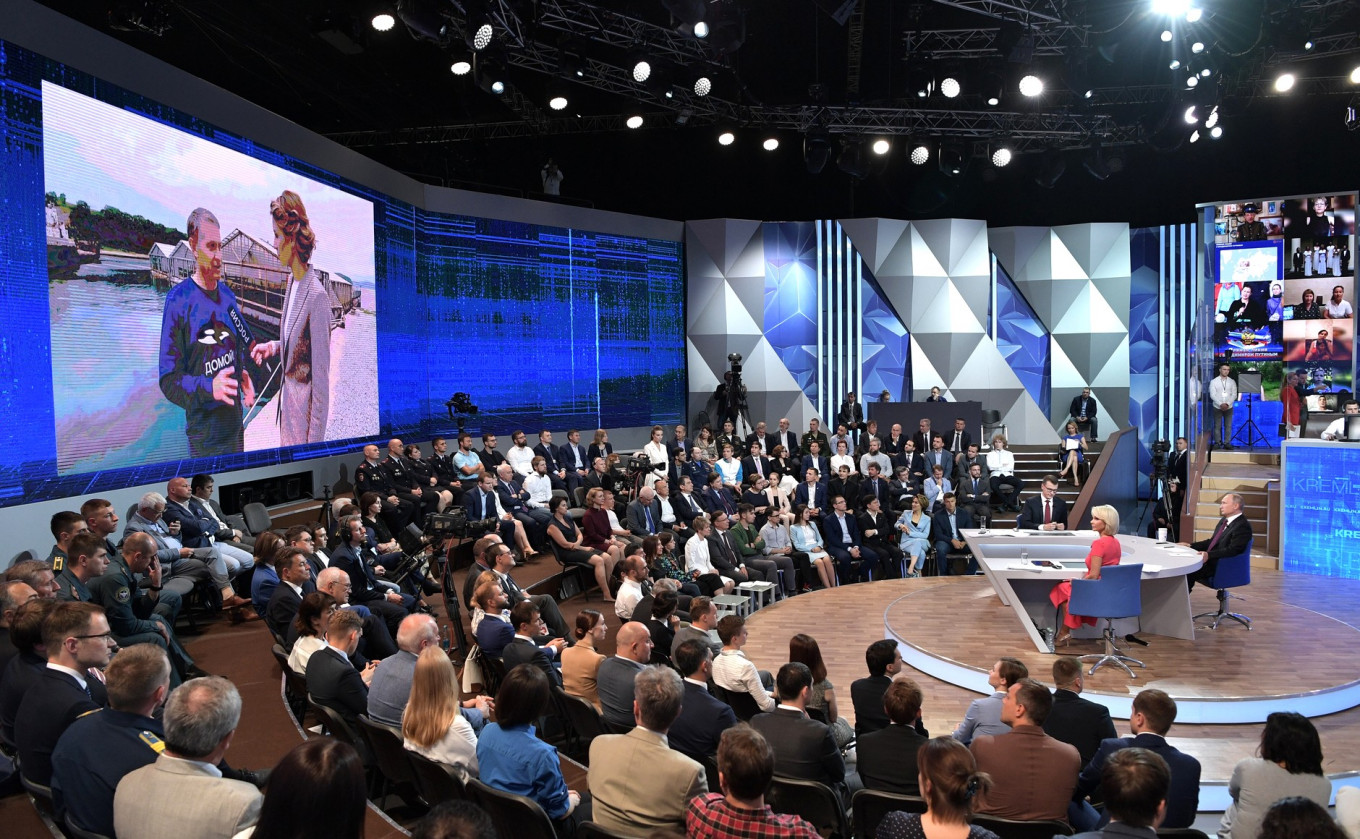Russian President Vladimir Putin’s is holding his annual question and answer session broadcast live on Thursday on state television.
The marathon Q&A session has become a yearly tradition during Putin’s nearly two decades in power, giving the Russian president a chance to shape narratives around pressing issues.
Here are the highlights:
On whether he has become tired of the presidency
“No, otherwise I wouldn’t have run for this term.”
On arrests related to economic crimes
“I would like to say: You cannot run away from us, we have long arms. But unfortunately, [many] still manage to get away.”
About feeling responsible for corruption
“I feel responsible for this outrage. And if I wouldn’t have felt responsible, you would not have known anything [about corruption] — just like in some other countries, and just like it used to be [in Russia.”
On Russia’s defense
“There is no country in the world that has such modern and technological weapons as we do. This is exactly what should make us proud of our country.”
On restoring relations with the West
“What do you mean reconcile? We did not enter into a dispute with anyone. And we have no such desire… If we surrender completely and disregard the changes that have transformed our nation, will there be any let-up [in sanctions]? There may be symbolic gestures, but nothing will drastically change.”
On sanctions and China
“We are accused of occupying Donbass [in Ukraine] — This is complete nonsense and lies. But China has nothing to do with it [Ukraine]. [U.S.] tariffs on its goods are essentially sanctions as well. They are growing and growing.”
On U.S. restrictions of Huawei
“An attack on Huawei. Where did it come from? And what is the point of it? The only point is to hold back China’s development, which has become a global competitor for another global power — the United States. The same thing is happening in respect to Russia and will be happening going forward.”
 kremlin.ru
kremlin.ruOn the impact of sanctions
“According to expert data, Russia, starting in 2014, has lost about $50 billion as a result of all these sanctions and restrictions, while the European Union lost $240 billion and the U.S. lost $17 billion.”
On liberalizing Russia’s anti-drug legislation
“We have a lot of convictions for drug trafficking violations, about 26 percent of the prison population. Do we need to liberalize this law? In my opinion, no. There can be no liberalization. The threat is too great.”
On the arrest of Ivan Golunov
“It is necessary to establish control over the activities of law enforcement agencies so that a situation like Golunov’s does not happen again.”
On Ukrainian President Volodymyr Zelenskiy
“He is a talented person. I remember his performances on KVN [comedy show] in Moscow in the 2000s. He is talented and funny, but what we are seeing now is not funny. This is not a comedy, this is a tragedy.”
“In the position where he is, you need to solve problems. During the election campaign, he talked about this and made it the core of his campaign message. [After taking office], he said that he was not going to talk to the [Ukrainian] separatists. How, then, can he solve the problem? In modern history, there are no conflicts that can be resolved without negotiations between the conflicting parties.”
On the new law on insulting the authorities
“This law is not about criticizing the authorities — people should have the right to bring attention to problems, including those relating to how government institutions function. The law is directed at insulting state symbols — so that no one allows themselves to sneer at the flag or coat of arms… Criminal responsibility [for this] exists in many countries, including Germany.”
On rumors of Russia uniting with Belarus
“We are not considering uniting into one state. We’re looking to fully implement the Treaty on the Creation of a Union State. But this does not mean a single government. It includes many elements — all the way to creating a union parliament and a common currency… We agreed with [Belarus President] Alexander Lukashenko to return to the treaty and see what should be implemented.”
On productivity
“In general, the way to solve these problems is to increase labor productivity, develop the economy and, as a result, increase citizens’ current standard of living.”
On falling incomes
“Indeed, the real incomes of citizens have declined over several years. The biggest decline was in 2016. Today, incomes are gradually recovering.”
“I want the people who are on the internet or sitting in front of their televisions to not be angry with me for not having these kinds of salaries [above the subsistence level]. This is normal. I am talking about average numbers.”
On officials’ salaries
“Imagine that a minister receives the same salary as an ordinary worker. I say this with a heavy heart. I would like ordinary workers’ incomes to increase. If we sharply lower the salaries of officials, they will simply run away, we will lose qualified personnel and this will eventually affect the population’s living standards. But the difference, of course, should not be colossal. I sometimes get caught when I look at their incomes.”
On consumer lending
“One of the significant elements of [household] expenses today are loan repayments. Banks today give out loans that are secured against 40 percent of wages, which is risky. In my opinion, the central bank should pay attention to this, because we don’t want to create these bubbles in the economy.”
This story is being updated.
Reuters contributed reporting.
